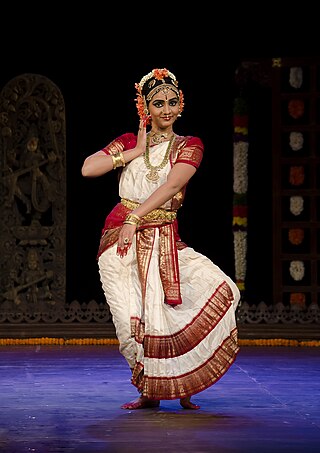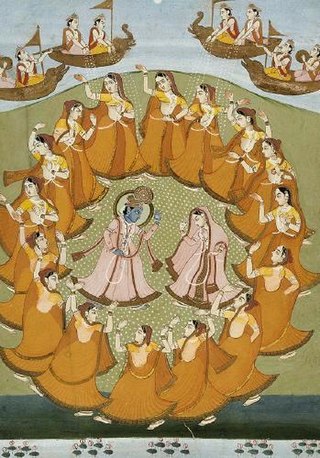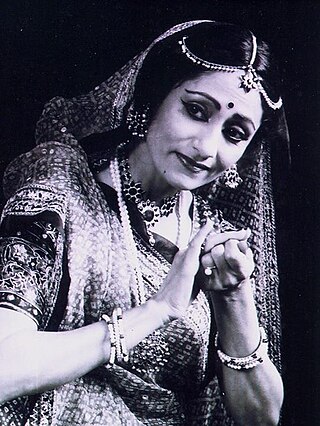
Kuchipudi is one of the eight major Indian classical dances. It originates from a village named Kuchipudi in the Indian state of Andhra Pradesh. Kuchipudi is a dance-drama performance, with its roots in the ancient Hindu Sanskrit text of Natya Shastra. It developed as a religious art linked to traveling bards, temples and spiritual beliefs, like all major classical dances of India.

Indian classical dance, or Shastriya Nritya, is an umbrella term for different regionally-specific Indian classical dance traditions, rooted in predominantly Hindu musical theatre performance, the theory and practice of which can be traced to the Sanskrit text Natya Shastra. The number of Indian classical dance styles ranges from six to eight to twelve, or more, depending on the source and scholar; the main organisation for Indian arts preservation, the Sangeet Natak Academy recognizes eight: Bharatanatyam, Kathak, Kuchipudi, Odissi, Kathakali, Sattriya, Manipuri and Mohiniyattam. Additionally, the Indian Ministry of Culture includes Chhau in its list, recognising nine total styles. Scholars such as Drid Williams add Chhau, Yakshagana and Bhagavata Mela to the list. Each dance tradition originates and comes from a different state and/or region of India; for example, Bharatanatyam is from Tamil Nadu in the south of India, Odissi is from the east coast state of Odisha, and Manipuri is from the northeastern state of Manipur. The music associated with these different dance performances consists many compositions in Hindi, Malayalam, Meitei (Manipuri), Sanskrit, Tamil, Odia, Telugu, Assamese, and many other Indian-Subcontinent languages; they represent a unity of core ideas and a diversity of styles, costumes, and expression.

Dance in India comprises numerous styles of dances, generally classified as classical or folk. As with other aspects of Indian culture, different forms of dances originated in different parts of India, developed according to the local traditions and also imbibed elements from other parts of the country.

Rishi Valley School is an Indian boarding school, founded by the philosopher Jiddu Krishnamurti. The school has a holistic approach to education in the spirit of Krishnamurti's pedagogical vision. Community service and extracurricular activities are part of the students' schooling, as are discussions, assemblies and club meetings.

Tandava, also known as Tāṇḍava Natyam, is a divine dance performed by Hindu god Shiva. Shiva is depicted as dancing the Tandava in his form of Nataraja.

Sangeet Natak Akademi is the national level academy for performing arts set up by the Government of India.

The Gundecha Brothers are Indian classical singers of the dhrupad genre of the Dagar vani. From 1985 to 2019 the duo consisted of brothers Umakant Gundecha and Ramakant Gundecha and were awarded the Padma Shri for art for 2012. Following the death of Ramakant Gundecha in 2019, his son Anant began to perform with Umakant in the Gundecha bandhu.

The Raslila, also rendered the Rasalila or the Ras dance, is part of a traditional story described in Hindu texts such as the Bhagavata Purana and Gita Govinda, where Krishna dances with Radha and the gopis of Braj. Rasalila has also been a popular theme for other India classical dances including Bharatanatyam, Odissi, Manipuri Raas Leela, Kuchipudi, and Kathak.

Pandit Sanjeev Abhyankar is a Hindustani classical music vocalist of the Mewati Gharana. Trained under Pandit Jasraj, he was a child prodigy and started his singing career at age 11. Since then has recorded over 60 solo albums and performed in over 200 cities across the world.

Swarnakamalam is a 1988 Indian Telugu-language dance film written and directed by K. Viswanath. The film stars Venkatesh and Bhanupriya in the lead, while Sharon Lowen appears in a special role. The film is about a danseuse daughter of a noted Kuchipudi exponent, wooed by a painter of banners and hoardings, who uses her as a model. The choreography is helmed by Kelucharan Mohapatra, and Sharon Lowen with soundtrack by Ilaiyaraaja. The song sequences were extensively shot at the Valley of Flowers National Park, the Nanda Devi National Park, the Shanti Stupa and Bhringesvara Siva Temple at Dhauli; and other locations in Visakhapatnam.
Komal Mahuvakar, better known by her stage name Rupini, is an Indian former actress who has appeared in Hindi, Tamil, Kannada, Malayalam and Telugu language films during the late 1980s and early 1990s.
Smitha Madhav is a Carnatic Classical Singer and Bharatanatyam Dancer. Carnatic music is a system of music commonly associated with the southern part of India and one of the two main classifications of Indian Classical Music.

Madhavi Mudgal is an Indian classical dancer known for her Odissi dance style. She has won several awards, including the Sanskriti Award, 1984, President of India's award of Padma Shri, 1990, the Orissa State Sangeet Natak Akademi Award, 1996, Grande Medaille de la Ville by Govt. of France, 1997, Central Sangeet Natak Akademi Award, 2000, Delhi State Parishad Samman, 2002 and the title of Nritya Choodamani in 2004.

Prateeksha Kashi is an Indian Kuchipudi dancer, a classical dance form originating from the village of Kuchipudi in Andhra Pradesh, India. Prateeksha Kashi holds a degree in Computer Science Engineer from BMS College of Engineering, Bangalore.

Rani Karnaa was an Indian classical dancer, known for her proficiency in the Indian dance form of Kathak, and regarded by many as one of the greatest exponents of the art form. She was honoured by the Government of India, in 2014, by bestowing on her the Padma Shri, the fourth highest civilian award, for her services to the field of dance.
The Cleveland Thyagaraja Festival is a 12-day festival of South Indian classical music and dance in Cleveland, Ohio, and is held each year around Easter weekend. The festival is a celebration in honor of Tyagaraja, the famous composer of Carnatic music, who composed thousands of devotional compositions, most in Telugu and Sanskrit language. The festival began in 1978, and has since grown to become the largest South Indian classical music and dance festival outside of India. The festival draws its audience from all over the United States, as well as from Canada and other parts of the world.

Dega Deva Kumar Reddy is an Indian educationist, film producer, and an entrepreneur. Deva Kumar is an alumnus of Rishi Valley School, a school founded by Jiddu Krishnamurti in Madanapalle, South India. He founded 'Srujana School' and produced Telugu feature films Ammayi Bagundi and Manasu Palike Mouna Raagam. He also produced 'Essence of Life' a synergy of five Indian classical dance forms based on Jiddu Krishnamurti teachings.














